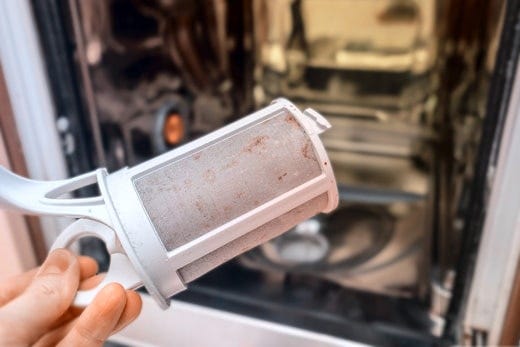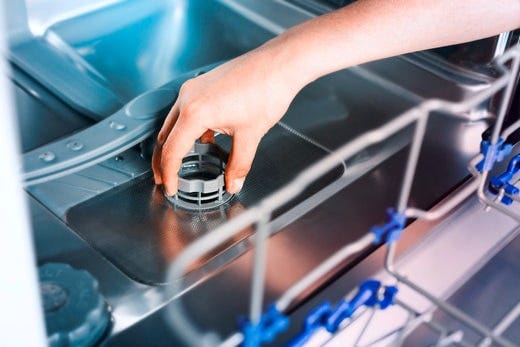
10 Tips to Clean and Descale Your Dishwasher
In this article, we'll explore ten tips to help you clean and descale your dishwasher effectively, ensuring it continues to deliver sparkling-clean dishes every time.

The dishwasher is a marvel of modern convenience, saving us time and effort in the kitchen. However, to keep this appliance running efficiently and extend its lifespan, regular maintenance is essential. One crucial aspect of dishwasher maintenance is cleaning and descaling.
Over time, mineral deposits, food residue, and grease can build up inside your dishwasher, leading to decreased performance and even unpleasant odors. If left unchecked, food and grease buildup can even result in a breakdown and necessitate expensive repairs.
In this article, we'll explore ten tips to help you clean and descale your dishwasher effectively, ensuring it continues to deliver sparkling-clean dishes every time.
1. Check the Owner's Manual
Before you begin any cleaning or maintenance activity on your dishwasher, consult the owner's manual. Manufacturers often provide specific guidelines for cleaning and descaling, including recommended dishwasher cleaning products and cleaning frequency. This step ensures that you follow the manufacturer's recommendations and helps maintain your dishwasher's warranty and optimize its performance.
2. Start with an Empty Dishwasher
Needless to say, you shouldn't clean or descale a dishwasher that's loaded with utensils. Start by removing all dishes, racks, and utensil holders from the dishwasher.
This step gives you clear access to the interior and prevents any obstructions during the cleaning process. It also ensures maximum efficiency of any cleaning products for your dishwasher.
3. Don't Forget the Spray Arms
Dishwasher spray arms are responsible for distributing water throughout the appliance to clean your dishes effectively. That makes it crucial to keep them clean and in proper working condition. Inspect the spray arms for clogs or debris that might hinder their rotation. If you find any blockages, use a toothpick or a small brush to clear them. Properly functioning spray arms are crucial for efficient cleaning.
4. Clean the Filter
This is likely the most crucial of dishwasher maintenance. Most dishwashers have a filter to catch food particles and debris during the wash cycle. Over time, it can become clogged, reducing the dishwasher's efficiency. Remove the filter according to your owner's manual instructions and clean it thoroughly. Ensure there are no remnants of food or grease left behind.
5. Wipe Down the Interior
Use a damp cloth or sponge to wipe down the interior of your dishwasher. Pay close attention to the door gasket and the edges of the door. These areas can accumulate residue and mold if not cleaned regularly. If you notice stubborn stains or buildup, consider using a non-abrasive dishwasher cleaner recommended by the manufacturer.
6. Descale with a Commercial Dishwasher Cleaner
Descaling is an indispensable aspect of dishwasher maintenance, as it plays a pivotal role in ensuring the smooth and efficient operation of your appliance. Over time, the water used in dishwashing contains minerals like calcium and magnesium, which can gradually accumulate on critical components within the dishwasher. These mineral deposits can hinder the appliance's performance, leading to a range of issues, from poor cleaning results to increased energy consumption.
To combat this, it is essential to tackle descaling with the right products and techniques. Follow the manufacturer's instructions for the specific product you choose.
7. Focus on the Door
The dishwasher door is a frequently overlooked area, but it can collect grime, residue, and even mold over time. Use a mild dishwasher detergent and a soft cloth or sponge to clean the door thoroughly. Pay attention to the edges, corners, and the latch mechanism.
8. Clean the Dishwasher Exterior
While your primary goal is to clean the interior of your dishwasher, don't forget about the exterior. Wipe down the front panel, controls, and the handle with a mild cleaner appropriate for the dishwasher's material (usually stainless steel or plastic). Keeping the exterior clean enhances the overall appearance of your kitchen.
9. Run a Maintenance Cycle
Some dishwashers come equipped with a maintenance or cleaning cycle. If your dishwasher has this feature, use it according to the manufacturer's recommendations. These cycles are designed to flush out any remaining residue and maintain the appliance's internal cleanliness. The maintenance or cleaning cycle is a dedicated program integrated into many dishwasher models, serving as an automated and comprehensive cleaning process. Its primary objective is twofold: to remove any remaining residue from previous wash cycles and to safeguard the dishwasher's internal cleanliness.
While your regular dishwasher cycles efficiently clean your dishes, they might leave behind traces of detergent, food particles, or mineral deposits. Over time, these remnants can accumulate, leading to diminished cleaning performance, unpleasant odors, and even mechanical issues.
Engaging the maintenance or cleaning cycle helps keep these problems at bay. It is a relatively straightforward process, with slight variations depending on your dishwasher model. In areas with hard water, which contains higher mineral content, more frequent cleaning may be necessary to prevent mineral deposits from accumulating.
10. Regularly Rinse and Pre-Treat
Scraping off excess food and rinsing off sauces and oils can significantly reduce the amount of residue that ends up inside your dishwasher. Consider using a dishwasher rinse aid as well. These products can help prevent mineral deposits and water spots on your dishes and the interior of the dishwasher.
Conclusion
A clean and well-maintained dishwasher not only ensures your dishes come out sparkling clean but also extends the appliance's lifespan. By following these ten tips, you can keep your dishwasher in optimal condition and avoid the headaches of clogs, odors, and reduced performance.
Remember to consult your owner's manual for specific guidance, and if you encounter any persistent issues, don't hesitate to seek professional help. With regular care, your dishwasher will continue to be a reliable kitchen companion for years to come.


